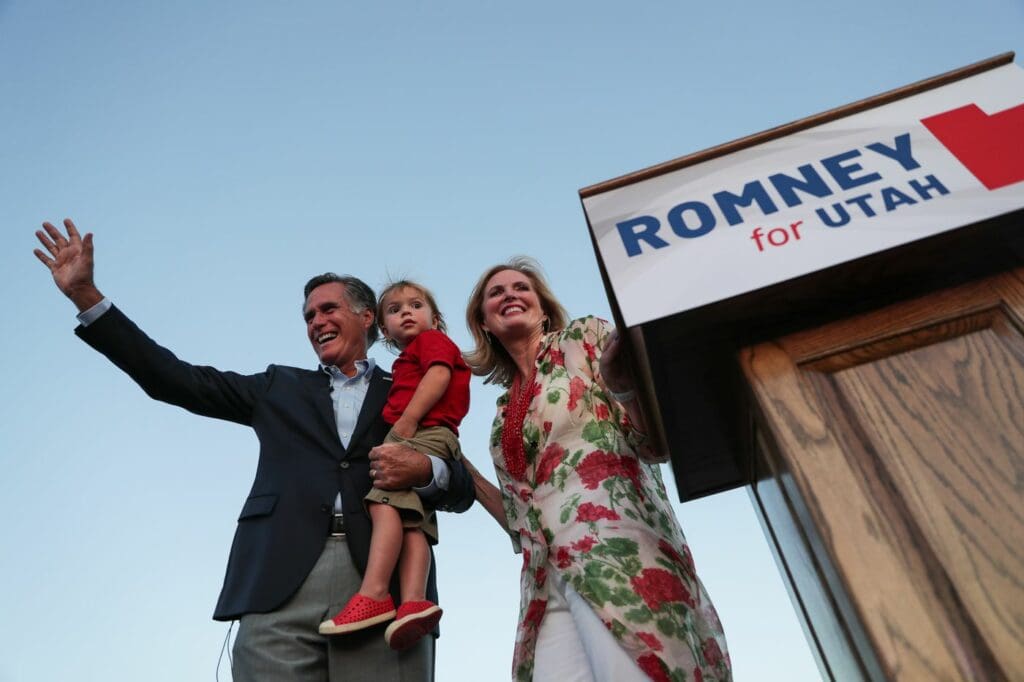His Family Security Act, which would pay parents a monthly stipend as they raise their children, has united an unusually diverse swath of experts and politicians.
A proposal by Mitt Romney to effectively turn the child tax credit into a deficit-neutral child allowance — a monthly payment to help parents with the cost of raising children — has some critics calling Utah’s junior Republican senator more progressive than conservative.
The former GOP presidential candidate and self-described budget hawk said his heart for those who struggle is a natural expression of the way he was raised and of his religion. His elected positions have given him opportunities to help alleviate some of the needs he sees.
While criticized during his 2012 presidential run as out of touch with America’s low-income populace, the millionaire businessman’s roles in the lay clergy of The Church of Jesus Christ of Latter-day Saints afforded him a close-up and very personal view of the wide range of struggles families and individuals can face. Church-appointed positions as bishop and later stake president not only made him a safe place for people to display their fragility and challenges, but also mandated that he minister to and share the burden of their pain.
That’s not unfamiliar ground for a man raised from a young age by his parents, Lenore and George Romney, to serve and observe others, he told the Deseret News.
“I think it’s very hard to separate who you are from your parents and from your faith.
“And I am very much a reflection of how I was raised and how I worship,” he said in a recent telephone interview.

George Romney was governor of Michigan and served as secretary of Housing and Urban Development during Richard Nixon’s first term as president. One of the senior Romney’s challenges was how to help low-income families secure stable housing.
When he blazed his own path into politics, Romney took those lessons of the heart with him. During his tenure as governor of Massachusetts, he oversaw development of statewide, near-universal health care coverage, among other policies. In the Senate, he championed the bill to end surprise billing, which can stick insured individuals with unexpected medical bills.
A confluence of events — from the pandemic and the related money woes that rained down on many Americans to the drop in the U.S. birth rate — has convinced Romney the time is right to provide some help to families who may be making important decisions about their children or even about having children because of costs and economic uncertainty. The financial assistance could instill some confidence that people could afford to have children. It might even convince some women not to have an abortion, he said. He’s convinced it would serve society well, too.
The declining birth rate worries him. It’s steep enough that “if we had the same birth rate over the last 12 years that we had back in 2008, we would have 5.8 million more young Americans than we do.
“For a civilization to survive and thrive, it must maintain its population.”
He said his Family Security Act, first suggested to him by his policy team, would “make it easier for people to form families and to have children and to be able to provide for the children after they’re born” without raising the cost to taxpayers. Funding would come from restructuring existing programs and tweaking the tax code.
He proposes giving parents $350 a month for young children and $250 for school-age kids, with a per-family cap and relatively high income limits.
The proposal has garnered praise from a broad mix of both conservatives and liberals, who seem to appreciate different qualities, while agreeing it could reduce the number of children in poverty.
The Niskanen Center, a moderate nonpartisan think tank, reported “the Romney child allowance would reduce U.S. child poverty by roughly one-third, and deep child poverty by half.” That’s not a trivial number. The Children’s Defense Fund says 1 in 6 U.S. children — nearly 12 million — live in poverty.
The payments would start four months before a baby is due to help with the cost of preparing for a child and give the woman confidence she’ll be able to support the baby, Romney said.
While he agrees the pandemic has spotlighted the financial challenges many Americans face, he admits his timing is also personally pragmatic.
“For me, why now is also pretty simple,” Romney, 74, said.
“Why not now? I’m not going to be in the Senate forever. And I wanted to get as much done as I can.”
History and timing
Since its introduction a few weeks ago, Romney’s proposal has become a popular topic on sociology blogs, think tank online discussions and in news articles. The interest is perhaps a bit unusual, given the idea is not new; diverse countries offer a child allowance. But in a time of political polarization, something about this proposal seems to unite an unusually diverse swath of experts.
Shawn Fremstad, a scholar with the Center for Economic and Policy Research, sees generational differences as one reason Romney’s proposal is getting so much attention right now. He said members of Generation X, his own cohort, are influenced by some of the arguments that began surfacing in the 1990s among intellectuals like sociologist Theda Skocpol, now a Harvard professor, that pushed for progressive programs rather than just anti-poverty measures.
He also thinks Americans aren’t oblivious to what the rest of the world does. In 2015, Canadian officials framed a child benefit as a cross-class initiative and its popularity with the middle class helped Justin Trudeau win reelection in 2019.
Policy during the Trump administration also moved further toward a universal child allowance, said Fremstad. The Tax Cuts and Jobs Act of 2017 increased the credit to $2,000 a child and boosted income thresholds for phasing the cuts out.
The history stretches back further than a lot of people think, according to historian Stephanie Coontz, director of research for the Council on Contemporary Families and a professor at The Evergreen State College.
“America was on track to develop better social policies for kids when Congress passed a Comprehensive Child Care Act in the 1970s,” she said. “But after Nixon vetoed it as government interference with individual family responsibility on the advice of (his assistant and political commentator) Pat Buchanan, child care, direct payments and other pro-child policies got caught up in the culture wars.”
But conservatives in other countries have warmed to a child allowance.
“The time is right for a child allowance because the United States has never seen childbearing rates as low as the ones we are now witnessing,” said sociologist W. Bradford Wilcox, a scholar with the Institute for Family Studies and American Enterprise Institute who also leads the National Marriage Project at the University of Virginia.
“In fact, conservatives in countries as different as Canada and Poland have moved in recent years to implement a child allowance to make it easier for families to afford the costs of raising the next generation.
“I am happy to see us moving in a similar direction.”

The pandemic clearly influences thinking, too, experts told the Deseret News.
“Legislators from both parties have been interested for some time now in expanding the child tax credit to provide more help for families. The COVID pandemic has been a real wake-up call in terms of how economy-wide events can disrupt families’ employment and finances,” said Jane Waldfogel, an authority on policies that impact the well-being of children and families.
“It makes sense that in looking for ways to provide more consistent support to families, Romney and others have proposed expanding the child tax credit into a child allowance,” said Waldfogel, who co-directs the Population Research Center at Columbia University, where she’s a professor of social work. She’s also written six books, most recently “Too Many Children Left Behind: The U.S. Achievement Gap in Comparative Perspective.”
Pros, cons and other plans
Besides increasing the amount of support significantly from the existing child tax credit, the Family Security Act embraces structural change: making the payments “fully refundable” to reach those who don’t earn enough to pay taxes; paying monthly instead of once a year; and having the Social Security Administration distribute the funds.
When people who qualify for a child-related credit receive a large check once they file their taxes, as happens now, they’re probably more likely to spend the money on a big purchase. While that could meet a real need, the money is probably less apt to help with ongoing child-rearing costs, said Romney, who views monthly payment as critical.
He’s adamant about dumping the marriage penalty in existing tax laws, he said. A news release from his office quoted New York Times conservative columnist Ross Douthat that the plan “reduces the current system’s penalties for marriage and its tacit bias against stay-at-home parents.”
Romney doesn’t like the notion that the more money a couple makes, up to a point, the more money they will get to support raising their children. “I think that’s a mistake,” he said.
That’s a sticking point for critics of his proposal, who believe a benefit should be tied to work.
“My main concern about the Romney proposal is that it would provide a flat benefit to nonworking families.
“He proposes to make the child tax credit fully refundable to all families with children,” American Enterprise Institute scholar Angela Rachidi recently said. “To make matters worse, he proposes to replace (Temporary Aid to Needy Families) with this child allowance, and TANF has a work requirement. He would be replacing a work-focused program with an unconditional cash transfer to poor nonworking families. It would reduce labor force participation among poor mothers and deprive them of a path toward upward mobility.”
Romney counters he doesn’t want to take from a couple the decision on whether one of them stays home with a child. “I think we should not create a penalty for moms or dads who want to stay home and raise the child while their spouse is working,” he said.
Still, he agrees it’s important to give people incentives to be part of the workforce. “That’s why we have the earned income tax credit, which provides a very substantial motivation for work. That’s something I certainly want to continue.”
While Romney said he understands there is legitimate concern that getting child support payments without work might encourage people to avoid work, that has not been the experience of other countries with similar plans. In fact, he said, more people go back to work rather than stay away from work. “I can’t describe precisely why that is, other than to believe that if people have confidence that their child is going to have support, they may be more willing to get back into the workforce themselves,” Romney said.
The point is making sure that children get what they need, he said.
“So I think it’s valuable to separate the important encouragement for work from the also-important support of bearing and rearing children.”
Others also wants to boost help for families, but the approaches are quite different.
Sen. Mike Lee, R-Utah, and Sen. Marco Rubio, R-Fla., successfully fought to double the child tax credit to $2,000 three years ago and they now propose increasing it to $3,500 a year for school-age children and $4,500 a year for younger children.
But Lee and Rubio express strong distaste for turning the credit into a child allowance paid monthly. And they want to reward work, so to get the full credit, an individual or couple would have to earn enough to qualify. A portion would be refundable, though, to provide some help to families that don’t earn enough.

Lee said increasing the benefit to $4,500 for young children eliminates a penalty for stay-at-home parents because it would give parents that extra $1,000 whether they use child care or not. Their plan eliminates an existing child care credit.
A proposal supported by the Biden administration would raise the child tax credit to $3,000 per older child and make it fully refundable. The credit would rise to $3,600 for children younger than 6, with a phase-out income cap. Like Romney’s proposal, it would be paid monthly, but distribution would be managed by the Internal Revenue Service.
Romney predicts changes will be suggested, some welcome, some not. He’ll keep in mind what his parents taught him. They were devoted, he said, to civil rights and the “recognition that all people were children of the same God and that we have a responsibility to care for one another. Particularly those in public service should be focused on the needs of the people who are the least among us, who are struggling financially or with other burdens.”
_____
To see original article please visit: https://www.deseret.com/platform/amp/2021/4/2/22356886/how-birth-rate-covid-help-drive-mitt-romney-family-security-act-to-bipartisan-support




















